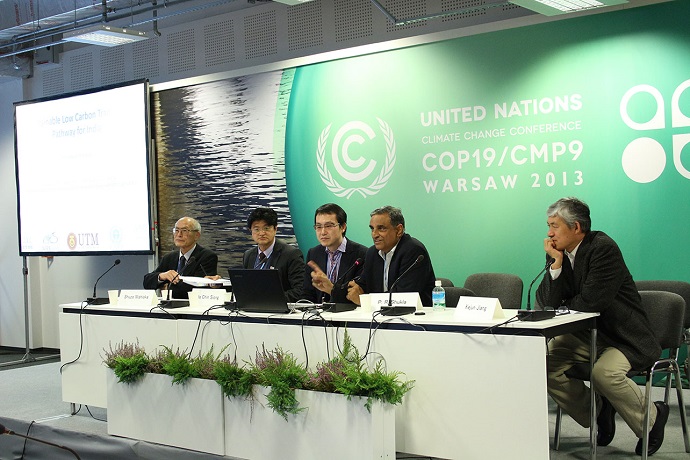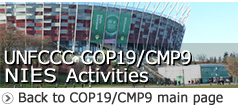Roadmap and Actions toward Low Carbon Societies in Malaysia and throughout Asia
NIES/UTM Side Event, Japan Pavilion, November 15

On November 15, NIES and Universiti Teknologi Malaysia (UTM) jointly coordinated the UNFCCC COP19/CMP9 official Side Event “Roadmap and Actions toward Low Carbon Societies in Malaysia and throughout Asia”.
Researchers on social systems from NIES and other research institutions in Japan and overseas have collaborated in the development of a methodology to create quantitative scenarios and roadmaps toward low carbon societies in Asia under the Environment Research and Technology Development Fund of the Ministry of the Environment, Japan (S-6 Low Carbon Asia Research Project). In addition, researchers from the Center for Social and Environmental Systems Research at NIES, Kyoto University, Okayama University, and UTM Malaysia have conducted collaborative research activities under the "Project for Development of Low Carbon Society Scenarios for Asian Regions" as part of the Science and Technology Research Partnership for Sustainable Development Program (SATREPS) supported by Japan International Cooperation Agency (JICA) and Japan Science and Technology Agency (JST).
At the side event, Dr. Mikiko Kainuma, a Fellow from the Center for Social and Environmental Systems Research first presented on “Realizing Low Carbon Asia: Contribution of Ten Actions”, details of which have been clarified through research outcomes from the S-6 Low Carbon Asia Research Project. Next, Prof. Ho Chin Siong of UTM presented the latest scientific findings and feedback from the “Low Carbon Society Blueprint for Iskandar Malaysia 2025 and its Roadmap” project conducted under SATREPS.
Subsequently, a case study for implementation plans and roadmaps toward low carbon societies reflecting the outcomes of analyses conducted using the Asia-Pacific Integrated Model (AIM), were introduced as “Iskandar Malaysia: Actions for a Low Carbon Future” by Ms. Maimunah Jaffar, Head of Planning & Compliance and Environment, Iskandar Regional Development Authority (IRDA). A further case study “Towards Putrajaya Green City 2025” was introduced by Mr. Dato’ Omairi bin Hashim, Vice President (City Planning), Putrajaya Corporation.
At the panel discussion, Dr. Jiang Kejun, Energy Research Institute, China; Prof. P.R. Shukla, Indian Institute of Management, India; and Prof. Dr. Ho Chin Siong, UTM Malaysia, discussed feasible measures and actions towards the realization of the two degree target, presenting their analyses using the AIM. Though there are a number of barriers in the planning and implementation of low carbon development strategies based on scientific knowledge, the transformation to sustainable low carbon societies in Asia will be crucial in the realization of the two degree target at the global scale.
The emphasis by Dr. Shuzo Nishioka, Secretary General of the International Research Network for Low Carbon Societies (LCS-RNet), based at the Institute for Global Environmental Strategies (IGES) on the necessity to promote research with the potential to contribute to low carbon development in Asia; and of the development of human resources towards LCS realization by establishing a center of excellence to facilitate the sharing of knowledge on sustainable low carbon development in the context and domains of each Asian country was in line with the outcomes of the previous discussions.
Side Events
-
 2013-11-21Responding to the adaptation challenges: an interactive session for mobilization of adaptation research and partner engagement
2013-11-21Responding to the adaptation challenges: an interactive session for mobilization of adaptation research and partner engagement
-
 2013-11-21Pathways toward Low Carbon Societies in Asia by 2050 and contributions of Japan to their realization
2013-11-21Pathways toward Low Carbon Societies in Asia by 2050 and contributions of Japan to their realization
-
 2013-11-25Dialogue on the agreed outcomes by 2015 under the Durban Platform process
2013-11-25Dialogue on the agreed outcomes by 2015 under the Durban Platform process
-
 2013-11-26Transition to Low-Carbon Resilient Societies: from Theory to Reality
2013-11-26Transition to Low-Carbon Resilient Societies: from Theory to Reality
-
 2013-11-27GHG emissions reduction potential in Asia for the two degree target
2013-11-27GHG emissions reduction potential in Asia for the two degree target
